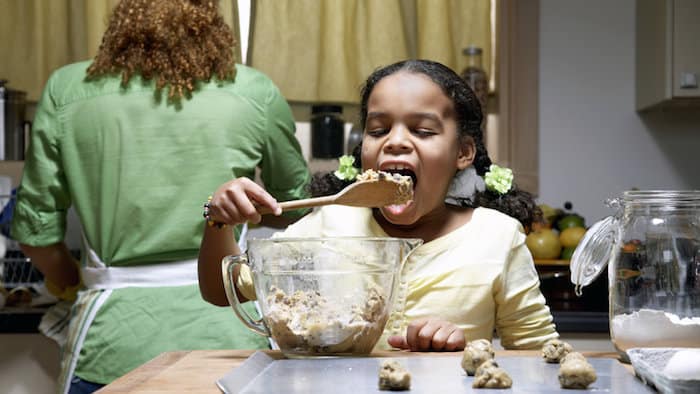
This is that special time of the year we enjoy making and eating those delicious homemade cookies, cakes and breads. And while “just a taste” of a yummy recipe batter may be tempting, think twice!! It is important to steer clear of ingesting any bit of unbaked dough or batter that needs to be cooked, as it can make you dangerously ill.
While many are aware of the concerns of raw eggs and salmonella in unbaked batters, recent reports have revealed that even a “taste” puts you at risk of getting infected with Escherichia coli (E. coli), because bacteria can thrive in raw, unbaked flour. The Centers for Disease Control and Prevention (CDC) identified a spike in the number of reported cases of E. coli infections in the past couple years and the investigation led to the flour. And, yes, even a small amount can make you very sick.
While children are generally at greater risk of getting food poisoning than adults, no one, at any age, should ever take a lick from a whisk or a taste from the batter. Whether it’s pre-packaged or homemade, the heat from baking is required to kill germs that might be in the raw ingredients. The finished, baked product is far safer — and tastes great. By following safe food handling practices when you are baking and cooking with flour, eggs and other raw ingredients – everyone can look forward to safely enjoying delicious homemade holiday treats.
DR. NINA’S WHAT YOU NEED TO KNOW: About Raw Batters and Dough
Raw Batter & Dough: Why you should never taste it
Most people when they think about health risks and cookie dough, they think about raw eggs. Eggs can be contaminated with salmonella bacteria, and food safety recommendations encourage people to cook eggs until the white and yolk are firm in order to kill any bacteria. Because of this concern, many people bake using eggs that have been pasteurized to kill any harmful bacteria without actually cooking the egg itself.
Now, there is another risk to consider in relation to raw dough: the risk of the flour itself. Just a week ago, a study published in The New England Journal of Medicine, reported on the detective work that led to the recall of more than 10 million pounds of flour in the summer of 2016! It confirmed that a type of E. coli bacteria previously discovered lurking in wet environments like hamburger meat and leafy vegetables, was also thriving in the dry host of flour. Food-borne illness experts underscored, “It’s a new view of flour – that this dry, powdery substance, stored on a shelf for months, could have a live micro-organism that didn’t spoil the flour but still could make you sick.”
Flour, typically a raw agricultural grain product directly from the field, generally has not been treated to kill germs or bacteria like E. coli. And germs can contaminate grain while it’s still in the field or at other steps as flour is produced. The FDA’s Office of Food Safety experts explain it this way, “If an animal heeds the call of nature in the field, bacteria from the animal waste could contaminate the grain, which could then be harvested and milled into flour.” And common “kill steps” applied during our food processing (so-called because they kill bacteria that cause infections) include boiling, baking, roasting, microwaving, and frying. But with raw dough, no kill step has been used. So for your final baked product, the high, sustained cooking heat will kill pathogens.
In addition to refraining from ever tasting uncooked flour dishes, it’s important to wash your hands in hot, soapy water after handling dough or flour, such as after dusting a rolling pin, counter top or dredging fish fillets. As for your final baked product: high, sustained cooking heat will kill pathogens.
Expanding The Caution: From Baked Goods to Play Dough to Homemade Ornaments
The recent study result expands the array of raw goods to be concerned about — to even include homemade playdough! In tandem with health professionals, the CDC has posted warnings: Do not taste or eat any raw dough or batter, whether for cookies, tortillas, pizza, biscuits, pancakes, or crafts made with raw flour, such as homemade play dough or holiday ornaments.
The U.S. Food & Drug Administration (FDA) Center for Food Safety and Applied Nutrition along with the Center of Disease Control and Prevention (CDC) who helped develop warnings on eating raw flour products, warn that children were among the most vulnerable noting, “As an adult you have the information to determine whether to take that risk, but when you give a child a ball of raw dough (or a taste of that batter), you’re putting risk values on that child.”
And parents and caretakers of young children should be particularly aware not only at home – but with other environments too. For instance, if your child is in day care or kindergarten, a common pastime may be art using “play” clay that is homemade from raw dough. Even if they’re not munching on the dough, they may be putting their hands in their mouth after handling the dough. Childcare facilities and preschools should discourage the practice of playing with raw dough or making homemade uncooked, play dough.
And so what about that cookie-dough ice cream? Good news, the commercial treats like cookie-dough ice cream is not only pasteurized but also heat-treated.
Symptoms: Effects from Eating Raw Dough
Raw food products can harbor bacteria that can cause you to become ill including fever, stomach pain, fatigue, and chills. And, too, we see symptoms of vomiting, diarrhea, and abdominal cramping because our body goes into full attack mode to get rid of the bacteria. In doing so, we lose fluids and also may not be able to ingest them, which can result in dehydration. Severe cases of dehydration can lead to acute kidney failure.
Generally, foodborne bacteria will cause symptoms within 1 to 3 days of eating the contaminated food – but sickness has been known to also occur within a half hour or up to 6 weeks later.
If you have any symptoms, see a medical doctor, immediately.
FDA Recommended Safety Tips When Handling Raw Dough
- Do not taste or eat any raw dough or batter, whether for cookies, tortillas, pizza, biscuits, pancakes, or crafts made with raw flour, such as homemade play dough or holiday ornaments
- Do not let children play with or eat raw dough, including dough for crafts
- Bake or cook raw dough and batter, such as cookie dough and cake mix, before eating
- Follow the recipe or package directions for cooking or baking at the proper temperature and for the specified time
- Do not make milkshakes with products that contain raw flour, such as cake mix
- Do not use raw, homemade cookie dough in ice cream (again, the cookie dough ice cream sold in stores contains dough that has been treated to kill harmful bacteria)
- Keep raw foods such as flour or eggs separate from ready-to eat-foods. Because flour is a powder, it can spread easily.
- Follow label directions to refrigerate products containing raw dough or eggs until they are cooked.
- Clean up thoroughly after handling flour, eggs, or raw dough:
- Wash your hands with warm running water and soap after handling flour, raw eggs, or any surfaces that they have touched
- During clean-up ensure that all the bowls, utensils, countertops, and other surfaces are washed thoroughly with warm, soapy water
- Consider using paper towels to clean up kitchen surfaces. If you use cloth towels, launder them often in the hot cycle.
- And if you have any recalled flour products in your home, throw them away
The recent investigative reports serve as a very important reminder to each of us as the FDA turns up the volume in warning to be vigilant at all times of the year – but an added reminder during these holidays as our kitchens heat-up
Like many of you, I love the tantalizing foods of the holidays–from gingerbread houses to sugar cookies to red velvet cake to bread pudding, the list goes on. I cherish the time spent together baking with my family and friends along with the delightful tastes that make for wonderful memories. But let’s be sure to take these steps to reduce your risk of experiencing harmful effects related to the batter handling. Enjoy! And Happy Holidays!!
Dr. Nina Radcliff is dedicated to her profession, her patients and her community, at large. She is passionate about sharing truths for healthy, balanced living as well as wise preventive health measures.
She completed medical school and residency training at UCLA and has served on the medical faculty at The University of Pennsylvania. She is a Board Certified Anesthesiologist. Author of more than 200 textbook chapters, research articles, medical opinions, and reviews; she is often called upon by media to speak on medical, fitness, nutrition, and healthy lifestyle topics impacting our lives, today.







